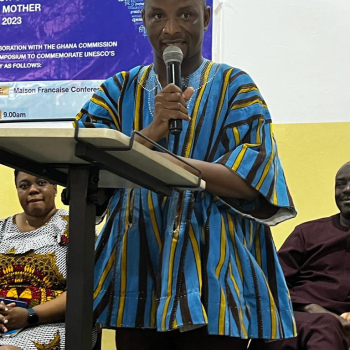Metaphorical Personal Names in Mabia Languages of West Africa

| 233248821519 | |
| asissah@uew.edu.gh | |
| Download CV |
Metaphorical Personal Names in Mabia Languages of West Africa
Cultural philosophies, belief systems and experiences serve as superordinate cultural concepts that are reconceptualised and expressed using metaphorical personal names in Mabia languages. Metaphorical personal names are ‘vehicles’ that transport the worldviews of speakers of Mabia languages to the target audiences. Every metaphorical personal name shares properties of a superordinate umbrella concept such that even newly created metaphorical names fall within an already existing cultural philosophy. This study argues that there is a corresponding relationship between a metaphorical personal name, the source domain, and its superordinate umbrella philosophical concept, the target domain. The study uses data from four Mabia ‘sister’ languages of West Africa: Dagbani, Kusaal, Likpakpaln, and Sisaali. The findings show that the source domains of these names include the name-bearer and the personal name itself, and the name-giver, whilst the target domains include flora and fauna terms, belief systems, innuendos and proverbs, experiences of name-givers, ‘death prevention’ labels, among others. The article also establishes that both sociocultural and ethnolinguistic factors influence the use of metaphorical personal names in the cultures under study. The Conceptual Metaphor Theory (CMT) is employed for the analysis of data in this research. The work uses the qualitative method and data are sourced from semi-structured interviews, from school registers and other previous studies on personal names in the selected languages
